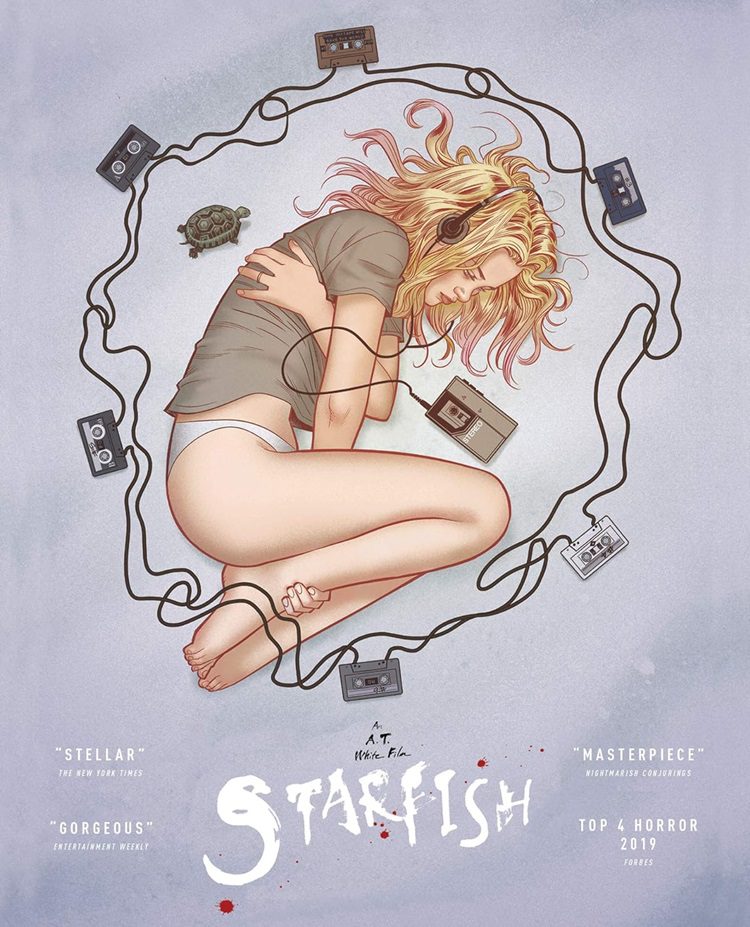
When the phrase “Based on a true story” pops on the screen, that is usually a signal that the following feature may be formulaic in its approach to recounting the events that took place. That is certainly not the case with A.T. White’s directorial debut, Starfish, which is based on a personal story and goes far beyond any conventional trappings. Yet, White’s film, while daring and visually striking, has a big problem with being cohesive. Maybe those are just the initial reactions and upon further exploration, the film will flow more smoothly and whatever questions I had will be answered.
Buy Starfish Blu-rayThe film begins with Aubrey Parker (Virginia Gardner) at a gathering for her friend, Grace, who has suddenly passed away from causes undisclosed to the viewer. Aubrey and Grace were close, but Starfish takes its time in detailing whether they were just friends or something more. It’s a smart move for White to not unload all of the details on the viewer in one expository-laced piece of dialogue or monologue. Instead, White slowly takes time to visually explore their relationship and how Aubrey is having difficulties overcoming Grace’s death.
Shortly after the wake, Aubrey breaks into Grace’s apartment to take care of her animals, spy on the neighbors having sex, and listen to vinyl records. Aubrey is having trouble dealing with the loss of her friend, and being in her apartment while doing these certain things is triggering to when times were good. The next morning, Aubrey wakes up to find that the apocalypse has struck. Her town is completely covered in snow, a plane has crash-landed nearby, and there’s no one else but her roaming the streets. As Aubrey wanders through her town, dealing with the grief that has struck her, she has to find a set of mixtapes that Grace has placed throughout town in order to figure out how the world can be reverted back to its normal state.
The portrayal of grief and sadness is depicted perfectly in Starfish. That feeling of complete isolation and everything around you turning into complete chaos is accurate and felt deeply in Gardner’s transcendent performance. It’s mostly her show for the film’s 100-minute runtime, and she is captivating the entire time. Christina Masterson does make a brief appearance as her friend, and their short conversation together is both humorous and touching.
Not only does White serve as writer and director for Starfish. He is also the film’s composer. One piece, in particular, sounds like it was sampled from Max Richter’s “On the Nature of Daylight,” but he doesn’t completely lift the tune and try to make his own version of it. Others come across as haunting and beautifully placed. It’s a terrific score. In addition, White has also selected a variety of songs to use for the film’s official soundtrack – all of which fit the movie well.
Where Starfish tumbles is in its abrupt changes to grief-stricken drama to apocalyptic survival story. The tone is jarring, but, on the other hand, it could be how people going through something as emotionally impactful as the death of someone close feel. White transports the viewer through different genres of filmmaking, including an animated sequence, and it’s all so beautiful to look at. It’s structurally bumpy, and at times frustrating, but it also leaves you with this feeling that there’s more underneath the surface.
Multiple viewings, most likely, will be required to fully understand Starfish, and I can see it having its own following later on down the road. White’s debut shows that he has the skill to work behind the camera and can bring about some of the most awe-inspiring visuals to the silver screen. It’s impressive for a first-timer to show such ambition in a film, and I’m eagerly anticipating what he has in store next.